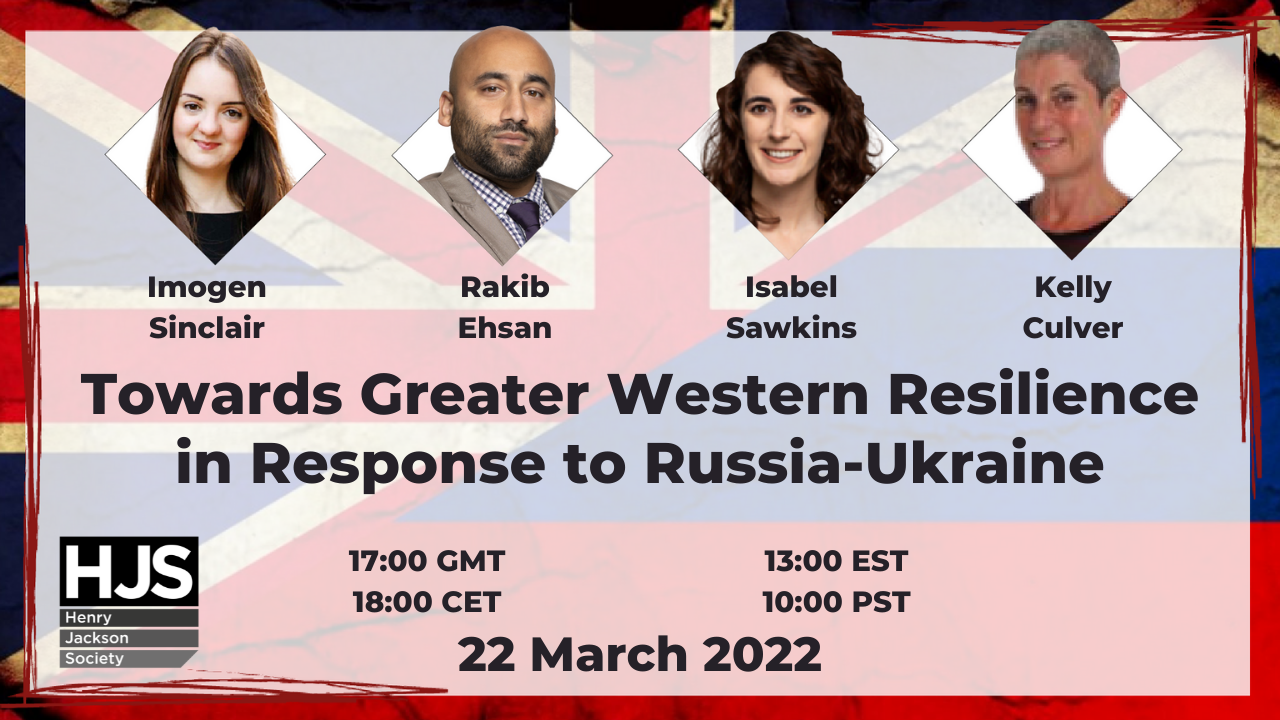Towards Greater Western Resilience in Response to Russia-Ukraine

- This event has passed.
Towards Greater Western Resilience in Response to Russia-Ukraine
22nd March 2022 @ 5:00 pm - 6:00 pm

The Russian invasion of Ukraine – the most serious military conflict in Europe since the Second World War – this has thrust into the spotlight the degree to which liberal democratic countries such as the UK are internally resilient and self-sufficient. While the UK has played an integral part in facilitating meaningful international action against the Kremlin following the invasion of Ukraine, it suffers from a range of internal weaknesses – relatively high rates of family breakdown, depressingly low levels of trust in politics, an ever-shrinking military, over-reliance on insecure domestic supply chains, failing energy policy and declining food self-sufficiency. There is no doubting that socially atomised nations with low levels of political trust and reliance on insecure supply chains are a gift for hostile and assertive anti-western states. And in the face of President Vladimir Putin’s revanchist militarism, there are serious debates to be had on how much of the West – especially its more intensely globalised and hyper-financialised economies – can make itself more resilient to inevitable conflict-driven international market shocks.
So, what are the key components of ‘resilience’ which need to be strengthened in the UK? How does the West bolster its collective resilience in an increasingly volatile and unpredictable world? Is this even possible when one considers competing nation-state interests?
The Henry Jackson Society is delighted to invite you to this highly topical event, Towards Greater Western Resilience in Response to Russia-Ukraine, which will be held on a virtual basis on Tuesday 22nd March 2022, 5pm-6pm GMT.

Dr Rakib Ehsan is an associate research fellow at the Henry Jackson Society, who sits in both the Centre on Radicalisation & Terrorism (CRT) and Centre on Social & Political Risk (CSPR). He holds a BA in Politics & International Relations (First-Class Honours), MSc in Democracy, Politics and Governance (Pass with Distinction), and a PhD in Political Science, all obtained from Royal Holloway, University of London. His PhD thesis, which was comprehensively sponsored by the Economic & Social Research Council (ESRC), investigated the impact of social integration on the public attitudes of British non-white ethnic minorities. Writing on concepts of resilience for publications such as Mail Plus and CapX, Rakib co-authored the Henry Jackson Society report ‘National Resilience Index 2020: An Assessment of the D-10’.

Kelly Culver FRSA, CMC is a passionate global entrepreneur, sustainability and resilience development leader. Her global business, The Culver Group Inc, is built on three integrated platforms – connecting, consulting and capacity development – bringing together brilliant global ideas to effect positive change and transformation. Her foundation, iIMPACT uIMPACT, explores the role innovation plays in shaping strategic decisions and creating effective, resilient, and sustainable strategies to the world’s wicked problems. A Fellow of the Royal Society of Arts, Manufactures and Commerce, Kelly is internationally recognised for her outstanding achievements in social progress and economic development in Small Developing States and Commonwealth countries. Kelly also is channelling her creativity and conducting ground-breaking research in strategic resilience as a doctoral candidate in the Paris School of Business Executive DBA Programme.

Imogen Sinclair is Director of the New Social Covenant Unit, a pressure group campaigning for stronger families and communities. She has several years’ experience working in Parliament and is the author of ‘Community Capital’ (2019) for the Centre for Social Justice. She holds a Masters with Distinction in Philosophy which she completed under the supervision of the late Professor Scruton.

Isabel Sawkins is a Research Fellow at the Henry Jackson Society. She has a BA in Modern Languages at Durham University and an MA in Political Sociology of Russia and Eastern Europe at UCL. She is currently completing a PhD on Holocaust memory in the Russian Federation at the University of Exeter, funded by the South West and Wales Doctoral Training Partnership (part of the Arts and Humanities Research Council). Isabel has presented her research at numerous international conferences. She has also published her findings in academic journals, as well as contributing to online media outlets. Isabel’s most recent accomplishment was the curation of an online exhibition about a Nazi death camp in occupied Poland.
***
EVENT SUMMARY
On the 22nd of March, Isabel Sawkins, Research Fellow at the Henry Jackson Society, Imogen Sinclair, Director of the New Social Covenant Unit, Dr Rakib Ehsan, Associate Research Fellow at the Henry Jackson Society, and Kelly Culver FRSA, CEO of The Culver Group, discussed how the United Kingdom and Western world can rebuild social, political and economic resilience in the face of a growing anti-democratic coalition.
Isabel Sawkins began the talk by introducing the topic of discussion and the speakers. Kelly Culver FRSA, defined resilience as the ability to absorb a shock without collapsing and gave examples of countries across the world that are seeking resilience. She then spoke about the history of the concept and how to implement resilience. Imogen Sinclair spoke about social resilience in the UK based off her own research. She argued stability is not guaranteed and Covid has exhausted the British public, she then spoke about the need for strengthening society in order to cope with globalisation. Dr Ehsan spoke about how while UK was good in fighting for equality the public has low levels of trust in politics, while also arguing that the UK needs to invest in energy and food security. He also spoke of how leaders need to rise above the culture war.
The discussion then closed with questions from the audience on what the else the Russia-Ukraine conflict has exposed about the UKs ability to withstand shocks, how to rebuild social cohesion, how to rebuild trust in society and which countries can the UK look to as a model for building resilience.


